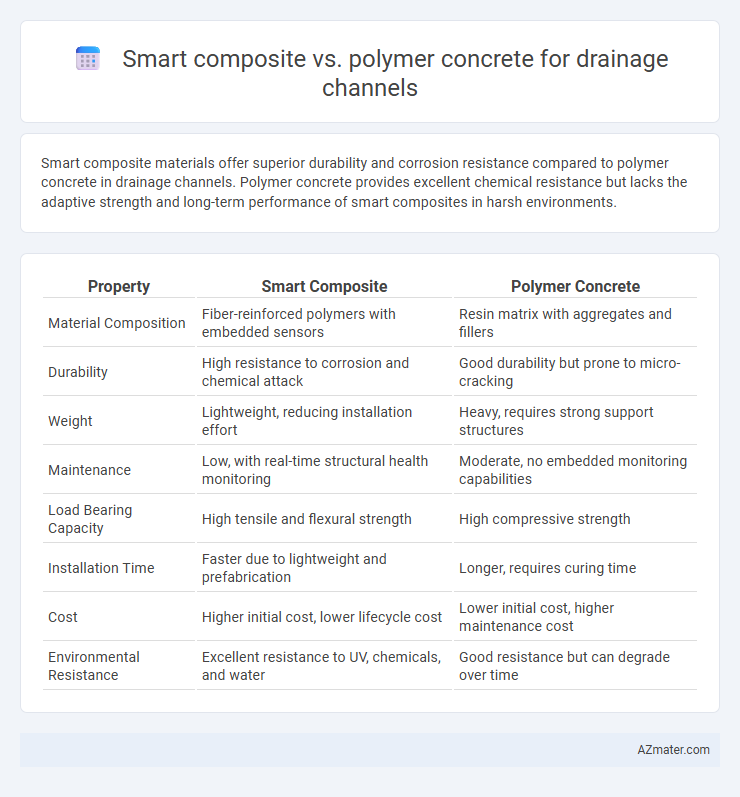Smart composite materials offer superior durability and corrosion resistance compared to polymer concrete in drainage channels. Polymer concrete provides excellent chemical resistance but lacks the adaptive strength and long-term performance of smart composites in harsh environments.
Table of Comparison
| Property | Smart Composite | Polymer Concrete |
|---|---|---|
| Material Composition | Fiber-reinforced polymers with embedded sensors | Resin matrix with aggregates and fillers |
| Durability | High resistance to corrosion and chemical attack | Good durability but prone to micro-cracking |
| Weight | Lightweight, reducing installation effort | Heavy, requires strong support structures |
| Maintenance | Low, with real-time structural health monitoring | Moderate, no embedded monitoring capabilities |
| Load Bearing Capacity | High tensile and flexural strength | High compressive strength |
| Installation Time | Faster due to lightweight and prefabrication | Longer, requires curing time |
| Cost | Higher initial cost, lower lifecycle cost | Lower initial cost, higher maintenance cost |
| Environmental Resistance | Excellent resistance to UV, chemicals, and water | Good resistance but can degrade over time |
Understanding Drainage Channel Material Requirements
Smart composites for drainage channels offer enhanced durability, chemical resistance, and load-bearing capacity compared to traditional polymer concrete. Polymer concrete provides excellent corrosion resistance and ease of installation, but may lack the adaptive material properties found in smart composites, such as self-healing or real-time stress monitoring. Understanding drainage channel material requirements involves evaluating factors like mechanical strength, environmental resistance, and longevity under dynamic loading conditions.
Overview of Smart Composite Technology
Smart composite technology in drainage channels integrates advanced materials such as fiber-reinforced polymers combined with sensors to enhance structural performance and durability. These composites offer superior resistance to corrosion, chemical attack, and mechanical stress compared to traditional polymer concrete, resulting in longer service life and reduced maintenance costs. Sensor integration enables real-time monitoring of structural health, allowing proactive maintenance and ensuring optimal functionality in wastewater management systems.
Fundamentals of Polymer Concrete
Polymer concrete is a composite material consisting of a polymer binder combined with aggregates, offering high chemical resistance, low permeability, and excellent mechanical strength ideal for drainage channels. Its fundamentals include using polymers like epoxy, polyester, or vinyl ester to bind aggregates, resulting in enhanced durability against corrosive environments compared to traditional cement-based materials. Smart composites integrate advanced sensors or self-healing properties but rely on the inherent benefits of polymer concrete's strong adhesion and rapid curing properties to improve structural performance in drainage applications.
Mechanical Strength Comparison
Smart composites exhibit superior mechanical strength compared to polymer concrete in drainage channel applications, offering enhanced tensile and flexural properties. The integration of smart fibers and nanomaterials in composites provides higher impact resistance and durability under load-bearing conditions. Polymer concrete, while corrosion-resistant and easy to mold, typically demonstrates lower compressive strength and stiffness, limiting its performance in high-stress environments.
Durability and Longevity: Smart Composite vs Polymer Concrete
Smart composites exhibit superior durability in drainage channels due to their enhanced resistance to chemical corrosion, abrasion, and environmental stressors, ensuring a longer service life in harsh conditions. Polymer concrete also offers substantial longevity with excellent chemical resistance and low permeability but may be more susceptible to UV degradation and thermal expansion over time. The choice between smart composite and polymer concrete depends on the specific environmental challenges and maintenance expectations for the drainage system.
Corrosion and Chemical Resistance
Smart composite materials exhibit superior corrosion resistance compared to polymer concrete in drainage channels, effectively withstanding aggressive chemical environments such as acids and alkalis. Polymer concrete offers good chemical resistance but may degrade faster under continuous exposure to harsh industrial effluents and chloride-rich waters. The advanced molecular structure of smart composites enhances durability and extends service life by preventing chemical infiltration and corrosion-related damage in drainage infrastructure.
Installation Efficiency and Handling
Smart composite drainage channels offer superior installation efficiency due to their lightweight nature and pre-fabricated modular design, allowing for quicker, less labor-intensive handling compared to polymer concrete. Polymer concrete channels, while durable, are significantly heavier and require specialized equipment and more labor for transportation and placement, leading to longer installation times. The enhanced maneuverability and reduced handling risks of smart composites contribute to cost-effective and time-saving drainage channel projects.
Environmental Impact and Sustainability
Smart composites offer enhanced durability and reduced maintenance for drainage channels, minimizing resource consumption and environmental degradation over time. Polymer concrete provides excellent chemical resistance and longevity, lowering the frequency of replacements and reducing waste generation in drainage infrastructure. Both materials contribute to sustainability by extending service life and improving recyclability, but smart composites often incorporate eco-friendly resins that further decrease carbon footprint.
Cost Analysis and Lifecycle Value
Smart composites offer higher initial costs compared to polymer concrete for drainage channels due to advanced materials and manufacturing processes. However, smart composites provide enhanced durability, corrosion resistance, and reduced maintenance expenses, leading to superior lifecycle value. Polymer concrete remains economically viable for projects with shorter lifespan requirements but may incur higher long-term costs due to susceptibility to wear and chemical degradation.
Choosing the Optimal Material for Modern Drainage Systems
Smart composites offer enhanced durability, chemical resistance, and lightweight properties ideal for modern drainage channels, outperforming traditional materials in longevity and maintenance costs. Polymer concrete, recognized for its high compressive strength and corrosion resistance, provides a cost-effective and fast-curing alternative suitable for heavy-load environments. Selecting the optimal material depends on specific project requirements such as load-bearing capacity, environmental exposure, and budget constraints, ensuring efficient and sustainable drainage system performance.

Infographic: Smart composite vs Polymer concrete for Drainage channel
 azmater.com
azmater.com